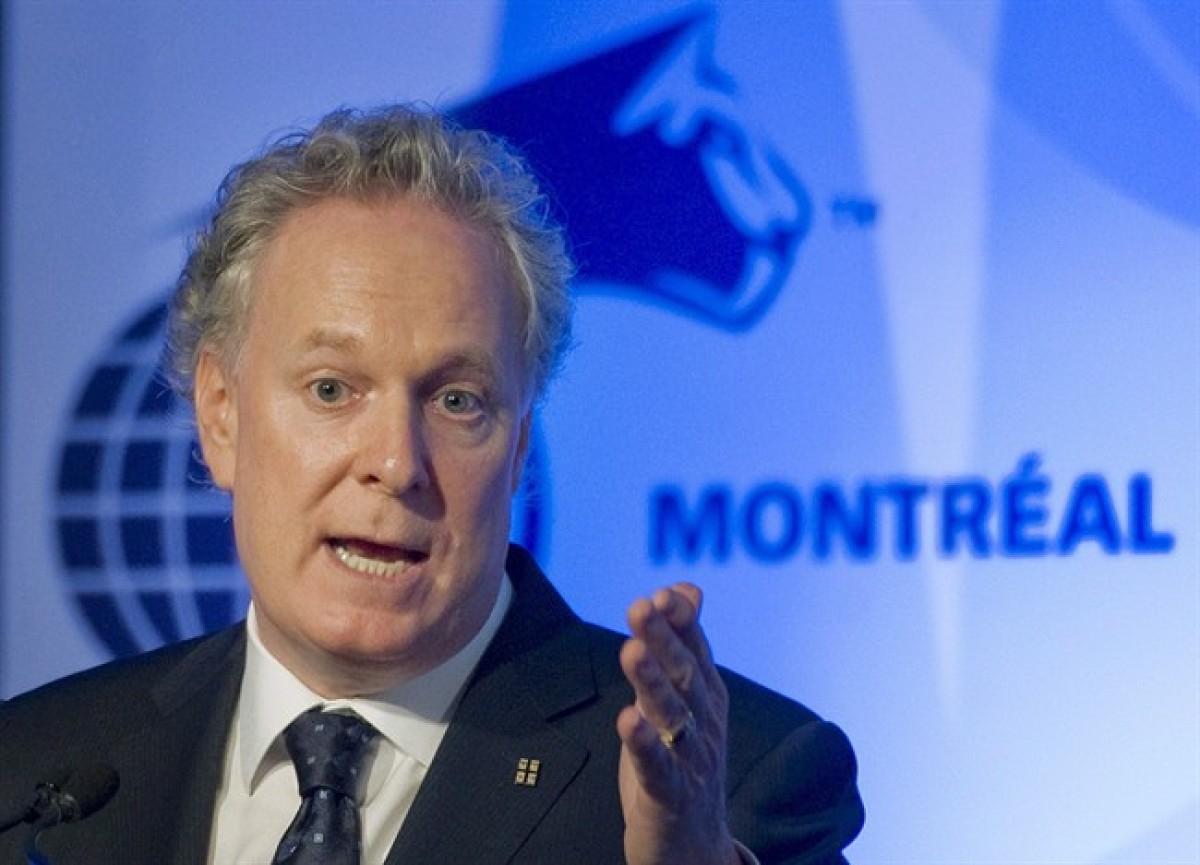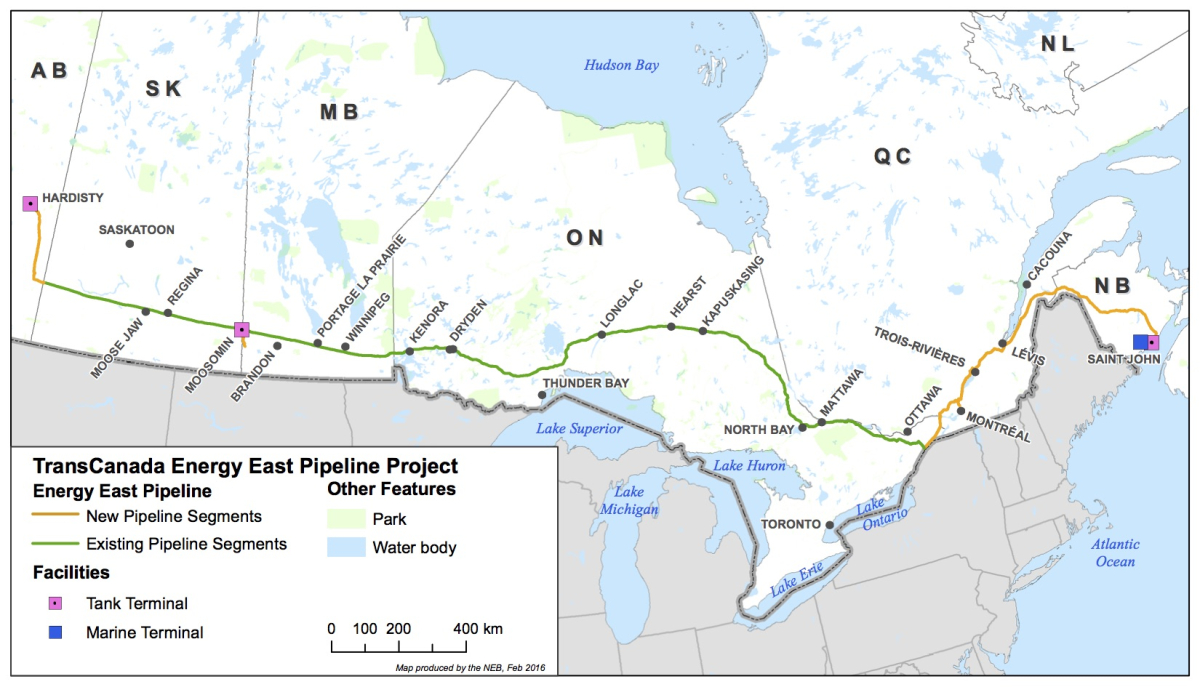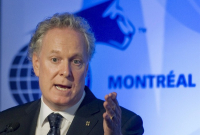Support strong Canadian climate journalism for 2025
Just 12 days after hearings into a major cross-Canada pipeline project were suspended because of a scandal over private meetings, an Irving Oil employee emailed the national energy regulator asking for a chat of his own.
The invitation to a member inside Canada's National Energy Board (NEB) has re-ignited charges that the regulator can't be trusted to protect the public interest because of its friendly relations with industry.
New-Brunswick-based Irving Oil is a major player in the proposed Energy East pipeline project and its employee sent his email invitation directly to Steven Kelly. Kelly was appointed to the NEB by the former Conservative government right before the last federal election campaign began in 2015.
“Steve, hope all is well with you,” wrote the Irving Oil employee in the email on Sept. 21, which was released to National Observer through access to information legislation. “Realized it has been a while since we’ve touched base and was wondering if you would be available to get together for a coffee in the near future. Hope to hear from you soon.”
Kelly described the man in a subsequent email as a "friend," but it's not clear what the Irving Oil employee wanted to discuss. The name of the employee was censored by the NEB in its response to the access to information request, but his email indicated that he was working in the company's Calgary office, across town from the federal regulator's headquarters.
Irving Oil didn't respond to questions
The New Brunswick-based company didn’t respond to phone calls and emails from National Observer or answer questions about why its employee sent the invitation to the Board member.
Kelly also did not respond to emails from National Observer asking when he last spoke to the Irving Oil employee or whether they had discussed the Energy East project after his 2015 appointment to the Board.
The NEB said in a statement emailed to National Observer that Kelly didn't respond to the invitation "in any way" but declined for several days to respond to questions about whether he had previous meetings with the Irving Oil employee. Moments after this report was published, NEB spokesman Craig Loewen emailed National Observer a new statement saying: "Mr. Kelly has had no interaction with the individual during his time at the Board."
But several Energy East opponents, interviewed by National Observer for this report, noted that the regulator's track record of private meetings with industry is what caused the scandal that forced recent recusals of federal officials and a suspension of the Energy East hearings.
When asked about the email, one such opponent, Lynaya Astephen, a New Brunswick resident who lives across the road from a proposed tank farm and marine terminal for the Energy East project, said it’s time for a public inquiry into the regulator’s cozy relations with the oilpatch.
“It sounds like (from) that email that they had previously spoken,” said Astephen, a spokeswoman from the Red Head Anthony’s Cove Preservation Association, in an interview. “I think that maybe it’s time to call for an independent investigation of the NEB so the public is assured that it’s not happening in the future.”

The NEB has extraordinary powers under Canadian law. Its powers are equivalent to a federal court, which means it's required by law to review projects in an open, fair and transparent manner. Board members appointed by the government have final say on decisions. But Kelly and other members of the Board are bound by a code of ethics that restricts private meetings with participants in active proceedings. As a result, all discussions with affected parties are required to be public and on the record for any matter that is under review.
These internal rules also exist to prevent conflicts of interest in decisions by the Board.
NEB appoints acting chief executive to oversee Energy East panel
It wasn't immediately clear whether Kelly had played a role in a decision announced last week that appointed an acting chief executive at the NEB to oversee future Energy East pipeline hearings, when they resume.
In its announcement, the NEB appointed Board member David Hamilton to act as chief executive for matters related to Energy East and for fellow Board member Philip Davies to act as an alternate to manage the work of a soon-to-be-appointed panel. But the NEB did not respond to questions about whether Kelly played a role in this decision or whether he would have been required to recuse himself also.

Both of these appointments were necessary following the recusals of the NEB's chief executive Peter Watson and vice-chair Lyne Mercier from any issue related to Energy East. Both had participated in a private meeting with former Quebec premier Jean Charest in January 2015 at a time when the former politician was on contract for the project developer, Calgary-based TransCanada Corp.
If approved, Energy East would ship up to 1.1 million barrels of crude oil per day across six provinces on a 4,500 kilometre route from Hardisty, Alberta to Saint John, New Brunswick. It is considered to be the largest oil pipeline ever proposed in Canada.
Irving Oil, a partner in Energy East, is a private company controlled by Arthur Irving, 85, and his family.
As National Observer's Bruce Livesey reported last spring, Arthur and his brother James (JK) Irving, 88, are perennials in the top ten of Canada’s richest people, worth (US) $7.4-billion and (US) $5.2-billion respectively, according to recent estimates by Forbes.
And their business has much to gain from Energy East pipeline's approval. Irving Oil operates Canada’s largest oil refinery, which is based in Saint John. The company also has a partnership stake in the Energy East project’s marine terminal and has told the federal regulator that it stands to benefit if the pipeline is approved.

TransCanada declined to answer a question from National Observer asking whether it was aware of the Irving Oil invitation. It also declined to say whether any of its own representatives had attempted to speak to Board members after the Sept. 9 announcement that the Energy East hearings were being suspended.
“We continue to await further detail from the NEB on next steps in the Energy East review process,” said TransCanada spokesman Tim Duboyce in an email to National Observer.
The new panel is expected to be appointed by Prime Minister Justin Trudeau’s government in the near future.
Critics call for inquiry

The recusals came about a month after the NEB was caught, this past August, making false and misleading statements about the private meeting that its senior officials held with Charest in January 2015. New Brunswick resident Astephen, who lives near the proposed Energy East tank farm and marine terminal, said that cases like these are shaking public confidence in the regulator.
“It makes me wonder if there are other situations like this, maybe (related to) Energy East, maybe other pipeline projects, where there are still NEB members that are in conflict of interest that are still meeting privately, such as (in) the Jean Charest affair,” said Astephen.
As of Oct. 31, Kelly wrote in a separate email, also obtained through access to information legislation, that he had not responded to the invitation from the Irving Oil employee, who he described as a friend, explaining that he had been on vacation.
“Please find below, an email from a friend who works for Irving Oil,” Kelly wrote in the second email, sent to another NEB staffer. “He reached out in September for a coffee. I was on holidays at the time and did not reply.”

André Bélisle, president of Association québécoise de lutte contre la pollution atmosphérique, a Quebec environmental group, has also called for a full inquiry into the pipeline regulator’s operations and private meetings.
“We always hope that every person has a lot of friends, but we must distinguish between friendly relations and professional relations,” Bélisle said in an interview with National Observer. “This is where the question of friends become delicate, because of all of this requires a (high) level of rigour, transparency and a respect for the law.”

Kelly is no stranger to controversy. He was appointed to the NEB in the summer of 2015 in the dying days of former prime minister Stephen Harper’s government, right before Canadian voters tossed out the Conservatives in a general election.
His appointment forced the NEB to temporarily suspend its hearings on Kinder Morgan’s Trans Mountain pipeline expansion project to the west coast. Kelly had participated in producing some of the evidence that was used by the company. This evidence later had to be stripped from the record after the NEB concluded that it would be a conflict of interest for panel members to evaluate and make decisions about the documents produced by their new colleague.
Irving Oil has 'substantial' interest in Energy East
Energy East is aggressively promoted by business leaders and the oil industry as being essential to creating jobs and growth in a sector that has been hammered by plummeting global commodity prices in recent years. But some economists say it's not clear whether a new pipeline would actually lead to new markets for Canada's oilsands companies due to above average production costs.
Many First Nations leaders, environmentalists and some local mayors are also opposed to new pipelines, saying that the government should instead take steps to stop expansion of Canada's oilsands sector, the country's fastest growing source of carbon pollution, in order to support growth in other industries and help meet national climate change goals.
For its part, Irving Oil has told the NEB that it has a “substantial interest” in Energy East.
“Irving Oil supports the need for the Energy East project because it will allow for material volumes of Western Canadian crude oil to be delivered to the Irving Oil Refinery in Saint John, NB for processing,” the New Brunswick oil company told the NEB in 2015 when it applied to be an intervenor at the regulator’s Energy East hearings.
“This will create important new opportunities for Irving Oil to diversify its supply chain and for Western Canadian producers to access new markets … Irving Oil has specific and detailed interests including commercial, property and other financial interests. Moreover, there is a strong degree of connection between these interests and the project.”

Board members and staff were patting themselves on the back for a job well done after their meetings on Jan. 15 and 16, 2015 with Charest and other important stakeholders.
At that time, they had earned positive media coverage following a joint announcement with Montreal Mayor Denis Coderre about plans to open a new office in downtown Montreal.
“I will note that the meetings we had in Montreal over the last two days have been very successful in building awareness and credibility of the NEB in Quebec,” wrote Jean-Denis Charlebois, an NEB director in an email sent to several senior officials on Jan. 16, 2015, including the regulator's chief executive Peter Watson and chief operating officer Josée Touchette.

This email, also obtained by National Observer through access to information legislation, included a list of instructions with seven items for staff to follow up on. The instructions were generated following the meetings with Charest and others about boosting the NEB’s credibility and image in Quebec.
By September of this year, all four Board members who attended the meeting, including the president and chief executive, Watson, were forced to recuse themselves from any dealings with Energy East, admitting that the meeting with Charest had created an appearance of bias that they were favouring the project developer.
Their recusals and the adjournment of the Energy East hearings stopped the regulator’s review of the pipeline project. But the NEB has declined to respond to questions from National Observer for nearly three weeks about which other top officials at the Board, if any, have been forced to recuse themselves.

The Trudeau government, as part of its 2015 election commitment to improve Canada's environmental laws, has launched a special review of the National Energy Board that is being led by a blue-ribbon panel of industry and government experts. Natural Resources Minister Jim Carr has said the panel has a mandate to consult with Canadians on changes to the regulator's governance structure, role and mandate, including the participation of Indigenous peoples.
“This targeted review will ensure that Canada's regulator serves the needs of Canadians into the future,” Carr said in a statement on Nov. 8.
Dyna Tuytel, a lawyer for Ecojustice who introduced one of the motions at the Energy East hearings that led to the recusals in September, said the NEB has internal rules that are meant to prevent inappropriate meetings and discussions with stakeholders. She noted that recent revelations are raising fresh questions about cases in which the regulator doesn't appear to be following its own rules.
“These circumstances are raising new issues that haven't previously been settled by the courts,” Tuytel told National Observer, in an email. “I'm not sure that this needs to be part of the NEB modernization because there are already clear limitations and procedures set out in the Board's own Code of Conduct and Governance Manual - the problems in this case are instances where those existing limitations and procedures, which are pretty thorough, appear not to have been followed. I suppose the rules could be formalized in the legislation as part of the review.”
Editor's note: This story was updated at 11:45 ET on Thursday to clarify the description of Irving Oil and its ownership.







Comments
Well I think it'd be great for me to lunch with Steve at the NEB. He'd consider my invitation too, wouldn't he? Of course he would--I'm easy going and personable.
David
And if Steve wasn't on vacation, what then?
Cozy tête-à-tête at Timmy's between "friends"?
The NEB cannot be trusted. Period.
BS baffles brains.
This article shows that the current NEB is not even following its own rules. The article along with others produced by Mike De Souza and the resignation of Robyn Allan from the NEB review of Kinder Morgan’s Trans-Mountain pipeline proposal demonstrate clearly that the NEB, far from acting as a regulator, is in the pocket of the oil and pipeline industries. Practically every act of the NEB is a betrayal of the trust of Canadians and results in an assault on the environment without adequate benefits to society.
The fact that Robyn Allan’s resignation was public months before the October, 2015, federal election is telling. There was plenty of time before the election was called for the Liberals to study that resignation and assess the adequacy or lack thereof of the NEB. They clearly didn’t do it.
The failure of the Trudeau government to shut down the NEB immediately after being elected and sworn in represents a betrayal of their pledge to restore trust in the NEB by shutting it down, moving it out of Calgary and appointing new members not in the clutches of the oil and pipeline industries.
This is simply another broken promise on the part of the Trudeau government.